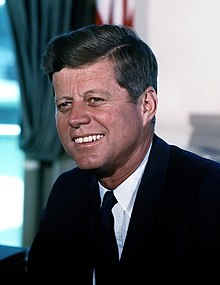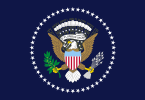John F. Kennedy
John F. Kennedy | |
|---|---|
 Oval Office portrait, 1963 | |
| 35th President of the United States | |
| In office January 20, 1961 – November 22, 1963 | |
| Vice President | Lyndon B. Johnson |
| Preceded by | Dwight D. Eisenhower |
| Succeeded by | Lyndon B. Johnson |
| United States Senator from Massachusetts | |
| In office January 3, 1953 – December 22, 1960 | |
| Preceded by | Henry Cabot Lodge Jr. |
| Succeeded by | Benjamin A. Smith II |
| Member of the U.S. House of Representatives from Massachusetts's 11th district | |
| In office January 3, 1947 – January 3, 1953 | |
| Preceded by | James Michael Curley |
| Succeeded by | Tip O'Neill |
| Personal details | |
| Born | John Fitzgerald Kennedy May 29, 1917 Brookline, Massachusetts, U.S. |
| Died | November 22, 1963 (aged 46) Dallas, Texas, U.S. |
| Cause of death | Assassination |
| Resting place | Arlington National Cemetery |
| Political party | Democratic |
| Spouse(s) | |
| Children | 4, including Caroline, John Jr., and Patrick |
| Parents | |
| Relatives | Kennedy family |
| Education | Harvard University (AB) |
| Signature | |
| Military service | |
| Allegiance | United States |
| Branch/service | United States Navy |
| Years of service | 1941–1945 |
| Rank | Lieutenant |
| Unit |
|
| Battles/wars | |
| Awards | |
John Fitzgerald Kennedy (May 29, 1917 – November 22, 1963)[2][3] often known as JFK and Jack, was an American politician who served as the 35th president of the United States from 1961 until his assassination in 1963.[4][5] Before becoming president, he was a U.S. senator from Massachusetts from 1953 to 1960. He was a U.S. representative for Massachusetts's 11th congressional district from 1947 until 1953.[6] Kennedy was the second youngest president in U.S. history, and also the youngest president in history to die while in office.[7]
Early life
[change | change source]Kennedy was born in Brookline, Massachusetts on May 29, 1917. He was the second of nine children of Joseph P. Kennedy (1888–1969). His father was a businessman and later US ambassador in the United Kingdom from 1938 until 1940. His mother was Rose Fitzgerald (1890–1995).
Kennedy graduated from Harvard University with a Bachelor's Degree in International Relations. Before World War II began, he tried joining the U.S. Army, but was rejected because he had back problems; he instead joined the Navy. When his PT boat was sunk by a Japanese destroyer in 1943, he seriously injured his back. He still saved his surviving crew, for which he was later rewarded with a medal for his bravery.
He was elected to the US Congress in 1946, and the US Senate in 1952. He married Jacqueline Bouvier on September 12, 1953. The couple had four children; a stillborn daughter (b. 1956), Caroline (b. 1957), John (1960–1999) and Patrick, who was born prematurely in August 1963 and lived only for two days.
Presidency
[change | change source]Kennedy was a member of the United States Democratic Party. He beat his Republican Party opponent, Richard Nixon, in the 1960 presidential election. Kennedy was the youngest president ever elected. He was also the first Roman Catholic President and the first president to win a Pulitzer Prize. Kennedy was a very good speaker and inspired a new generation of young Americans, and is the only president to have been awarded a purple heart.
In the beginning of his term, he approved the CIA's plan to invade Cuba. After the invasion turned out to be a failure, the Cuban Missile Crisis began. During the crisis, Cuba ordered a lot of nuclear missiles from the Soviet Union. It was the closest the world was to having a nuclear war. Kennedy ordered US Navy ships to surround Cuba. He ended the crisis peacefully by making an agreement with the Soviet Union. They agreed that the Soviet Union would stop selling nuclear weapons to Cuba. In return, the U.S. would take its missiles out of Turkey and promise to never invade Cuba again.
He also created a plan called the New Frontier. This was a series of government programs, such as urban renewal, to help poor and working class people. He created the Peace Corps to help poor countries all over the world. He agreed to a large tax cut to help the economy. He also called for the Civil Rights Act of 1964, which would make discrimination and segregation illegal. Kennedy intended to reach a détente with Cuban Premier, Fidel Castro, and to withdraw all US military advisers from Vietnam.[8]
Assassination
[change | change source]Kennedy was assassinated on November 22, 1963, in Dallas, Texas. He was being driven through the city in an open-top car, along with John Connally, the Governor of Texas. As the car drove into Dealey Plaza, shots were fired. Kennedy was shot once in the throat and once in the head. He was taken to Parkland Memorial Hospital 4 miles (6.4 km) away. At 1:00 p.m., Kennedy was pronounced dead.
Lee Harvey Oswald, a former U.S. Marine, was the prime suspect in the murder, and he was arrested on the same day for the murder of a policeman called J. D. Tippit. Oswald denied shooting anyone and was killed two days later on November 24 by Jack Ruby.
Kennedy had a state funeral on November 25, three days after his murder, near to the White House. He was buried in Arlington National Cemetery in Arlington, Virginia.
Legacy
[change | change source]After Kennedy died, Lyndon Johnson (his Vice President) took over and put many of Kennedy's ideas into law (see Great Society).
Kennedy was a very popular president and still is today. He is considered one of the greatest presidents, ranking highly in public surveys and opinion polls.[9][10]
References
[change | change source]- ↑ "John F. Kennedy Miscellaneous Information". John F. Kennedy Presidential Library & Museum. Archived from the original on August 31, 2009. Retrieved February 22, 2012.
- ↑ "Life of John F. Kennedy | JFK Library". www.jfklibrary.org. Retrieved 2023-11-07.
- ↑ "John F. Kennedy | Biography, Siblings, Party, Assassination, & Facts | Britannica". www.britannica.com. 2023-11-01. Retrieved 2023-11-07.
- ↑ "John F. Kennedy - Quotes, Wife & Assassination". Biography. 2021-04-19. Retrieved 2023-11-07.
- ↑ "John F. Kennedy". The White House. Archived from the original on 2023-05-05. Retrieved 2023-11-08.
- ↑ "John F. Kennedy | Miller Center". millercenter.org. 2016-09-26. Retrieved 2023-11-07.
- ↑ "November 22, 1963: Death of the President | JFK Library". www.jfklibrary.org. Retrieved 2023-11-07.
- ↑ JFK's embrace of third world nationalists
- ↑ Dallek 2003, p. 700.
- ↑ "The American Experience – JFK".
Other websites
[change | change source]- JFK Library and Museum
- JFK Library and Museum Online Store
- "John F. Kennedy". Find a Grave. Retrieved 2013-11-17.
- Presidents of the United States
- 1917 births
- 1963 deaths
- Assassinated presidents of the United States
- Burials at Arlington National Cemetery
- Deaths by firearm in Texas
- John F. Kennedy
- Kennedy family
- People from Brookline, Massachusetts
- People of the Vietnam War
- Pulitzer Prize winners
- 1960 United States presidential candidates
- United States representatives from Massachusetts
- United States senators from Massachusetts
- Democratic Party (United States) politicians
- Time People of the Year


